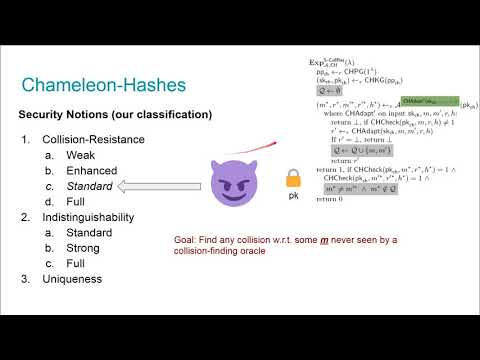CryptoDB
Bringing Order to Chaos: The Case of Collision-Resistant Chameleon-Hashes
| Authors: | |
|---|---|
| Download: | |
| Abstract: | Chameleon-hash functions, introduced by Krawczyk and Rabin at NDSS 2000, are trapdoor collision-resistant hash-functions parametrized by a public key. If the corresponding secret key is known, arbitrary collisions for the hash function can be efficiently found. Chameleon-hash functions have prominent applications in the design of cryptographic primitives, such as lifting non-adaptively secure signatures to adaptively secure ones. Recently, this primitive also received a lot of attention as a building block in more complex cryptographic applications ranging from editable blockchains to advanced signature and encryption schemes. We observe that in latter applications various different notions of collision-resistance are used, and it is not always clear if the respective notion does really cover what seems intuitively required by the application. Therefore, we revisit existing collision-resistance notions in the literature, study their relations, and—using the example of the recent redactable blockchain proposals—discuss which practical impact different notions of collision-resistance might have. Moreover, we provide a stronger, and arguably more desirable, notion of collision-resistance than what is known from the literature. Finally, we present a surprisingly simple and efficient black-box construction of chameleon-hash functions achieving this strong notion. |
Video from PKC 2020
BibTeX
@article{pkc-2020-30296,
title={Bringing Order to Chaos: The Case of Collision-Resistant Chameleon-Hashes},
booktitle={Public-Key Cryptography – PKC 2020},
series={Public-Key Cryptography – PKC 2020},
publisher={Springer},
volume={12110},
pages={462-492},
doi={10.1007/978-3-030-45374-9_16},
author={David Derler and Kai Samelin and Daniel Slamanig},
year=2020
}

